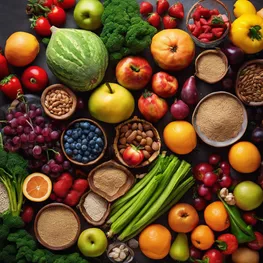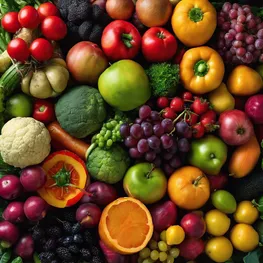Table of contents
- Unraveling the Impact of Sugar on Blood Sugar Levels
- Indulge in Healthy Treats to Satisfy Your Sweet Tooth
- Mindful Eating: Enhancing Dessert Consumption
- Powerful Ways to Improve Blood Sugar Management through Lifestyle Changes
In a world full of sugary temptations, it can be challenging to make mindful dessert choices that satisfy your sweet tooth without sacrificing your health. However, by exploring natural alternatives and incorporating mindfulness into your eating habits, you can indulge in delicious treats guilt-free. In this article, we will delve into the art of making mindful dessert choices and discover how to enjoy sweets while nourishing your body.
Unraveling the Impact of Sugar on Blood Sugar Levels
Consuming excessive sugar can cause blood sugar levels to spike due to the rapid breakdown of sugar in the digestive system. When we consume large amounts of sugar, the body releases insulin to regulate blood sugar. However, excessive sugar consumption overwhelms the body's insulin production, leading to a sharp increase in blood sugar levels. This sudden spike in blood sugar can have several negative effects, such as increased risk of diabetes, weight gain, and inflammation. Therefore, it is important to limit sugar intake to maintain healthy blood sugar levels.
Indulge in Healthy Treats to Satisfy Your Sweet Tooth
Indulge in healthy treats to satisfy your sweet tooth by enjoying a variety of fruits that are low in sugar and can be enjoyed as desserts. Some of these fruits include strawberries, raspberries, blackberries, and blueberries. These berries are not only low in sugar but also packed with vitamins, antioxidants, and fiber. Another great option is kiwi, which is not only low in sugar but also high in vitamin C. Lastly, you can enjoy a refreshing and sweet treat by having a slice of watermelon, which is low in sugar and has a high water content. So go ahead and treat yourself to these delicious and guilt-free fruit desserts!
Mindful Eating: Enhancing Dessert Consumption
In our fast-paced and busy lives, it is easy to overlook the simple pleasures in life, such as enjoying a delicious dessert. However, it is important to be present and savor each bite while indulging in sweet treats. Mindful eating enhances dessert consumption in several ways:
-
Enhances Taste Experience
Being present while eating desserts allows us to fully appreciate the flavors, textures, and aromas. It enables us to notice the subtle nuances and complexities of each bite, enhancing the overall taste experience.
-
Increases Satisfaction
When we savor each bite, we give ourselves the opportunity to truly enjoy and be satisfied with the dessert. By being fully present, we can engage all our senses and fully immerse ourselves in the moment, leading to greater satisfaction and fulfillment.
-
Promotes Mind-Body Connection
Being present and mindful while eating desserts helps us cultivate a stronger mind-body connection. We become more aware of the signals our body sends us regarding hunger, fullness, and satisfaction, allowing us to make better choices regarding portion sizes and overall consumption.
-
Reduces Overeating
By savoring each bite and being present while indulging in desserts, we are less likely to overeat. Practicing mindfulness while eating helps us recognize our body's signals of fullness and prevents mindless eating, reducing the risk of consuming excessive amounts of dessert.
-
Enhances Enjoyment of the Moment
By being present and savoring each bite, we can fully immerse ourselves in the experience of eating dessert. It allows us to slow down, appreciate the present moment, and find joy in the simple pleasure of indulging in a sweet treat.
Powerful Ways to Improve Blood Sugar Management through Lifestyle Changes
Regular exercise has numerous benefits in managing blood sugar levels. By incorporating physical activity into your daily routine, you can significantly improve your body's ability to regulate glucose. Here are some key benefits of regular exercise in managing blood sugar levels:
-
Improved insulin sensitivity
Exercise enhances the responsiveness of your cells to insulin, allowing them to effectively absorb glucose from the bloodstream. This helps to lower blood sugar levels and prevent insulin resistance.
-
Increased glucose uptake
Engaging in physical activity stimulates the muscles to take up glucose from the blood without the need for insulin. This can be particularly beneficial for individuals with insulin resistance or type 2 diabetes.
-
Weight management
Regular exercise promotes weight loss and weight maintenance, which plays a crucial role in managing blood sugar levels. Maintaining a healthy weight reduces the risk of developing insulin resistance and type 2 diabetes.
-
Reduced risk of complications
Consistent exercise helps to lower the risk of complications associated with high blood sugar levels, such as cardiovascular disease, nerve damage, and kidney problems.
-
Improved cardiovascular health
Exercise strengthens the heart and improves circulation, reducing the risk of cardiovascular diseases. It also helps to lower blood pressure and cholesterol levels, which are often elevated in individuals with diabetes.
In conclusion, making mindful dessert choices can not only satisfy your sweet tooth but also promote a healthier lifestyle. By opting for natural sweeteners like honey or maple syrup, incorporating fruits into your desserts, and being aware of portion sizes, you can enjoy your desserts guilt-free. These choices provide a more nutritious alternative to refined sugar-laden treats while still satisfying your cravings. So next time you have a sweet tooth, try some mindful dessert options and indulge in the goodness of nature without compromising on taste or health.
Frequently asked questions related to mindful dessert choices
What are mindful dessert choices?
Mindful dessert choices refer to making conscious and intentional decisions about the types of desserts you consume. It involves being aware of the ingredients, portion sizes, and overall nutritional value of your sweet treats.
How can I satisfy my sweet tooth naturally?
To satisfy your sweet tooth naturally, you can try incorporating naturally sweet ingredients into your desserts, such as fruits like bananas, berries, or dates. You can also experiment with healthier alternatives like dark chocolate or natural sweeteners like stevia or coconut sugar. Another option is to make homemade desserts using wholesome ingredients and reducing the amount of added sugars.
What are some examples of mindful dessert choices?
Some examples of mindful dessert choices include opting for desserts made with natural sweeteners like honey or maple syrup instead of refined sugar. Choosing desserts that are rich in nutrients, such as those made with whole grains, fruits, and nuts, is also a mindful choice. Additionally, selecting smaller portion sizes and practicing moderation can be part of a mindful approach to dessert.
Can mindful dessert choices still be delicious?
Absolutely! Mindful dessert choices can still be delicious and satisfying. There are countless recipes available that use natural sweeteners, whole grains, and healthy fats to create mouthwatering desserts. By being creative and open to trying new ingredients and flavors, you can enjoy desserts that are both nutritious and tasty.
Why is it important to make mindful dessert choices?
Making mindful dessert choices is important for maintaining a balanced and healthy diet. By being aware of what you are eating, you can choose desserts that provide both satisfaction and nourishment. It also helps in preventing excessive consumption of sugary and processed foods.
Are there any health benefits to mindful dessert choices?
Yes, there are several health benefits to making mindful dessert choices. By choosing desserts that are made with nutritious ingredients, you can boost your intake of vitamins, minerals, and fiber. Mindful dessert choices can also help in maintaining stable blood sugar levels and reducing the risk of developing chronic diseases, such as obesity and diabetes.







